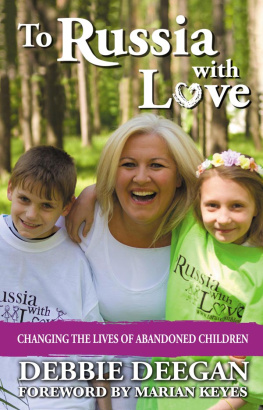About the Publisher

We hope you enjoyed this book.
Since 1944, Mercier Press has published books that have been critically important to Irish life and culture. Books that dealt with subjects that informed readers about Irish scholars, Irish writers, Irish history and Irelands rich heritage.
We believe in the importance of providing accessible histories and cultural books for all readers and all who are interested in Irish cultural life.
Our website is the best place to find out more information about Mercier, our books, authors, news and the best deals on a wide variety of books. Mercier tracks the best prices for our books online and we seek to offer the best value to our customers, offering free delivery within Ireland.
Sign up on our website to receive updates and special offers.
www.mercierpress.ie
www.facebook.com/mercier.press
www.twitter.com/irishpublisher
Mercier Press, Unit 3b, Oak House, Bessboro Rd, Blackrock, Cork, Ireland
MERCIER PRESS
3B Oak House, Bessboro Rd
Blackrock, Cork, Ireland.
 www.mercierpress.ie
www.mercierpress.ie
 http://twitter.com/IrishPublisher
http://twitter.com/IrishPublisher
 http://www.facebook.com/mercier.press
http://www.facebook.com/mercier.press
Text: Debbie Deegan, 2012
Foreword: Marian Keyes, 2012
ISBN: 978 1 78117 038 0
Epub ISBN: 978 1 78117 164 6
Mobi ISBN: 978 1 78117 165 3
This eBook is copyright material and must not be copied, reproduced, transferred, distributed, leased, licensed or publicly performed or used in any way except as specifically permitted in writing by the publishers, as allowed under the terms and conditions under which it was purchased or as strictly permitted by applicable copyright law. Any unauthorised distribution or use of this text may be a direct infringement of the authors and publishers rights and those responsible may be liable in law accordingly.
Contents
marian keyes
Okay, imagine youre an ordinary Dublin housewife, well call you Debbie, Debbie Deegan. And imagine that sixteen years ago you took two Russian orphans into your home for a month for a holiday. And imagine that you became completely besotted with the two little girls and couldnt bear the thought of sending them home. And imagine that one of the little girls contracted meningitis and was too sick to travel, but the other little girl wasnt so lucky no meningitis for her and had to go back.
And imagine that you were so tormented by your adopted daughters memories of her former classmates, that you decided to go to Russia to find them, and all your friends and family told you you were a big eejit and to cop on to yourself. And imagine that you didnt speak a word of Russian but you flew to Minsk in the winter, persuaded someone to drive you and eventually found the orphanage, in Hortolova, eight hours south of Moscow.
And imagine that it was worse than your worst nightmares filthy, stinking, crumbling, with broken, damaged children running around in the middle of winter with no shoes on their feet and that you were carried out of there a complete basket case.
And imagine that when you got back to Ireland, your friends and family said, See, didnt we tell you you were a big eejit, and you replied, Shut up, Im holding a fund-raising coffee morning, get baking. And imagine that instead of the usual 4.73, you raised 7,000 and all of a sudden youd founded To Russia With Love.
* * *
With head-spinning speed Debbie found herself sitting down with architects and finding people in Russia who could supervise the rebuilding of an orphanage that housed 150 orphans. (I cant tell you how much this fills me with awe. When my boiler breaks and Ive to get a plumber, Id rather tear off my own head and eat it than have to listen to all the reasons why my boiler cant be fixed and why I need a brand new expensive one instead.)
Her plan had been a quick in-and-out, to make everything shiny and modern and new, then she could walk away and slot back nicely into her old life, almost as if nothing had happened. But then she fell in love with the children. 150 children. 150 individuals. 150 human beings, some clever, some cute, some funny, some sporty, some geeky. As diverse and unique as all people are except that they shared one thing, they had all been denied love, security, safety and any sort of childhood. They were all damaged, but even the most well-adjusted of the children obviously some human beings are just innately better at survival than others were desperate for love and affection. And it was then that Debbie understood the real reason fate had brought her to this place the actual bricks and mortar of the orphanage were almost incidental, shed been brought there to love the children better.
After I became patron of the charity, I braced myself to visit the orphanage and I might as well tell you, I was dreading it. I thought the accumulated weight of all their sad stories would kill me. But first impressions were hopeful. Since the rebuilding, the orphanage isnt one big, gloomy, Dickensian edifice any longer, but a series of charming wooden houses built in a circle. The bedrooms only two to three kids to a room are cheery and colourful. But theres no getting away from the fact that these kids are in this place because terrible things have happened to them.
Many of them come from places of horrific violence. And many oh so many of them have been abandoned emotionally, if not actually, by their parents alcoholism. (Lots of the kids still have a parent who is alive, but theyre social orphans, in that the parent isnt fit to take care of them.) Because of this Id expected the children might be difficult, bratty, withdrawn who could blame them considering what theyve already endured in their short lives? But they were variously charming, polite, mischievous, earnest, sweet, thoughtful, affectionate and above all and most moving dignified. I couldnt get over it.
And its entirely down to Debbie and her team that even though there are 200 children in Hortolova, theyre all treated like individuals, just as they would be in a family. I was very moved by the myriad humane little touches, the thoughtfulness, the treats like taking a load of the lads to Moscow for the Russia versus Ireland match. Or like giving children choices most orphans have no say in what they eat, what they wear, where they sleep: they get what they get and they can like it or lump it. But Hortolova children are brought to the market and allowed to pick out their own clothes. Mind you, when this first started the children were so paralysed by lack of practice that the market visits took forever.
Ten years after Debbie first became involved, five children from the orphanage went to university. When you think of what they came from, when you think of what their lives were like before Debbie, this is nothing short of a miracle.
Today, Debbie and To Russia With Love (with the support of the Russian authorities) work in each of the twelve orphanages in the region of Bryansk and have literally transformed the lives of thousands of children in the last fourteen years.












 www.mercierpress.ie
www.mercierpress.ie http://twitter.com/IrishPublisher
http://twitter.com/IrishPublisher http://www.facebook.com/mercier.press
http://www.facebook.com/mercier.press